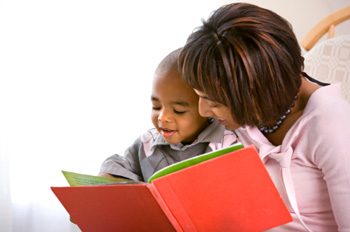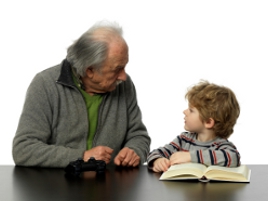Reading Timeline: When Should My Child Learn to Read?
The path to reading for your child begins long before he or she is looking at words on the page. This article includes a general guideline of milestones along the way to learning to read. Your child may reach different points on the timeline at different ages and this is completely normal.

 |
Developing Speech
Most children begin to say their first words in their first year, or by midway through their second year. During the early speech development phase of the first few years, your child will build his or her vocabulary exponentially. Following those first few words come many hundreds by age three, then many thousands by age five.
Learning the Alphabet
As early as age two, children begin to learn the alphabet. Recognizing the shapes of letters rarely starts before age two, though some children may reach age four before achieving strong alphabet comprehension. Learning the alphabet begins with the letters that have the simplest shapes, like O and X. Understanding more complex shapes take additional time.
Pre-Reading
Pre-reading includes mastering the alphabet, but extends into additional acts associated with reading. This phase continues for many children through age six. When your child is a pre-reader, he or she won't only identify letters, but will also experiment with them and identify the various sounds they make.
 |
Many connections are being made at this stage between the stories you're reading and the words on the page. At a fundamental level, this is when your child begins to understand that books contain stories with meanings. More than that, your child will see the letters on the page as forming words, which in turn form stories.
The pre-reading phase includes what is known as 'imitation reading' or 'pretend reading.' Your child will begin to repeat stories back to you from memory. This is easier with very simple, short or rhyming stories. Your child will likely begin with the stories you have read most often and it's common for children at this stage to request the same stories be read to them over and over again. This repetition fosters improved comprehension that furthers reading development.
Decoding
Decoding begins in kindergarten or first grade and may continue into second grade. This is the stage where your child will begin to identify words with increasing complexity. It begins with monosyllabic words of just a few letters, like cat or sun. Your child at this time is taking his or her accumulated knowledge of letters and understanding how they work together. Much of the work at this stage involves the slow sounding out of letters and words.
Fluent Reading
By second or third grade, your child should become relatively fluent as a reader. This includes both reading and writing words without sounding out every letter. As your child becomes more comfortable with the reading process, he or she will continue to reread the same books. This builds comfort and speed. During this time, your child is also transitioning from simply understanding the words to comprehending their meanings.
Other Articles You May Be Interested In
-
Reading Timeline: When Should My Child Learn to Read?

The path to reading for your child begins long before he or she is looking at words on the page. This article includes a general guideline of milestones along the way to learning to read. Your child may reach different points on the timeline at different ages and this is completely normal.
-
Read My Lips: Babies Learn to Talk From More Than Just Hearing Sounds

It's long been understood that babies experience speech and emotional development through hearing and eye contact. Speak and smile at a baby and they will listen, look into your eyes and smile back. But a new study shows that infants as young as six months old begin to watch a speaker's mouth when he or she talks. Can this...
We Found 7 Tutors You Might Be Interested In
Huntington Learning

- What Huntington Learning offers:
- Online and in-center tutoring
- One on one tutoring
- Every Huntington tutor is certified and trained extensively on the most effective teaching methods
K12

- What K12 offers:
- Online tutoring
- Has a strong and effective partnership with public and private schools
- AdvancED-accredited corporation meeting the highest standards of educational management
Kaplan Kids

- What Kaplan Kids offers:
- Online tutoring
- Customized learning plans
- Real-Time Progress Reports track your child's progress
Kumon

- What Kumon offers:
- In-center tutoring
- Individualized programs for your child
- Helps your child develop the skills and study habits needed to improve their academic performance
Sylvan Learning

- What Sylvan Learning offers:
- Online and in-center tutoring
- Sylvan tutors are certified teachers who provide personalized instruction
- Regular assessment and progress reports
Tutor Doctor

- What Tutor Doctor offers:
- In-Home tutoring
- One on one attention by the tutor
- Develops personlized programs by working with your child's existing homework
TutorVista

- What TutorVista offers:
- Online tutoring
- Student works one-on-one with a professional tutor
- Using the virtual whiteboard workspace to share problems, solutions and explanations